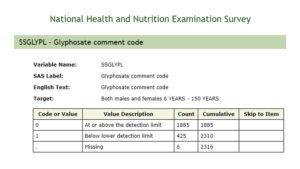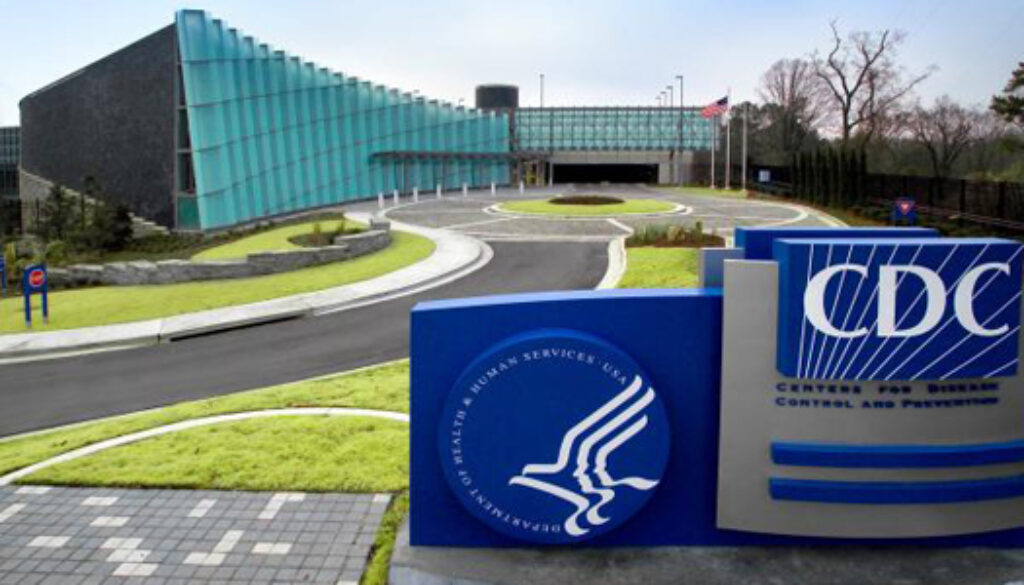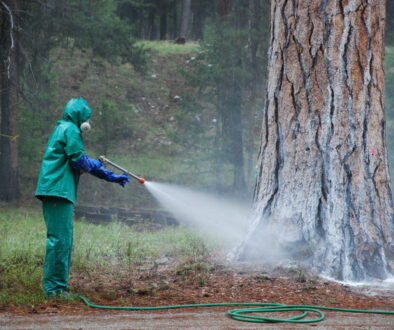CDC finds weed killer tied to cancer in over 80 pct of US urine samples
In fresh evidence of the pervasive nature of pesticides, more than 80 percent of urine samples drawn from children and adults participating in a US health study contained a weedkilling chemical linked to cancer and other health problems.
The June 30 report by a unit of the Centers for Disease Control and Prevention (CDC) found that out of 2,310 urine samples collected, 1,885 were laced with detectable traces of glyphosate, the active ingredient in herbicides sold around the world, including the widely used Roundup brand.
The new data was released as part of the National Health and Nutrition Examination Survey (NHANES), which relies on a series of ongoing studies to evaluate the health and nutritional status of adults and children in the United States. NHANES research is typically highly valued by scientists because the sampling is designed to be representative of the US population.
NHANES says in order to produce reliable statistics, it “over-samples” African Americans, Hispanics and people 60 years old and older.
Also, a CDC spokesperson said the agency’s National Center for Environmental Health (NCEH) “is working on analyzing glyphosate” through additional data.
Academics and private researchers have been noting high levels of the herbicide glyphosate in analyses of human urine samples for years. But the CDC has only recently started examining the extent of human exposure to glyphosate in the United States, and its work comes at a time of mounting concerns and controversy over how pesticides in food and water impact human and environmental health.
“I expect that the realization that most of us have glyphosate in our urine will be disturbing to many people,” said Lianne Sheppard, professor at the University of Washington’s department of environmental and occupational health sciences. “Now from this NHANES analysis we know that a large fraction of the population has it in urine. Many people will be thinking about whether that includes them.”
Sheppard co-authored a 2019 analysis that found glyphosate exposure increases the risk of non-Hodgkin lymphoma, and also co-authored a 2019 scientific paper that reviewed 19 studies documenting glyphosate in human urine.
That latter paper concluded that more robust research was needed to “fully understand the extent of exposure overall and in vulnerable populations such as children.”
The CDC work now is a “huge step” toward addressing that need, Sheppard said.
Found in baby food
Both the amount and prevalence of glyphosate found in human urine has been rising steadily since the 1990s when Monsanto Co. introduced genetically engineered crops designed to be sprayed directly with Roundup, according to research published in 2017 by University of California San Diego School of Medicine researchers.
Paul Mills, the lead researcher of that study, said at the time there was “an urgent need” for a thorough examination of the impact on human health from glyphosate in foods people commonly consume.
More than 200 million pounds of glyphosate are used annually by US farmers on their fields. The weedkiller is sprayed directly over genetically engineered crops such as corn and soybeans, and also over non-genetically engineered crops such as wheat and oats as a desiccant to dry crops out prior to harvest. Many farmers also use it on fields before the growing season, including spinach growers and almond producers. It is considered the most widely used herbicide in history.
Residues of glyphosate have been documented in an array of popular foods made with crops sprayed with glyphosate, including baby food. The primary route of exposure for children is through the diet.
Roughly 87% of children represented in the CDC study had the pesticide in their urine, according to a population-weighted analysis by the Environmental Working Group (EWG) research organization. In 2019, EWG and several food companies called for a ban on glyphosate as a desiccant, saying “Americans’ widespread exposure to glyphosate is of growing concern, particularly in the context of children’s health, because of the potential risk of cancer.”
Monsanto, and its owner Bayer AG, maintain that glyphosate and Roundup products are safe and that residues in food and in human urine are not a health risk.
But many researchers disagree and say there is a large body of evidence linking glyphosate exposure to disease. The International Agency for Research on Cancer, a unit of the World Health Organization, classified glyphosate as a probable human carcinogen in 2015.
The US Environmental Protection Agency (EPA) has taken the opposite stance, classifying glyphosate as not likely to be carcinogenic. But last month the 9th U.S. Circuit Court of Appeals issued an opinion vacating the agency’s safety determination and ordering the agency to give “further consideration” to evidence of glyphosate risks.
Research indicates the chemical is also tied to other health problems, including liver disease.
“People of all ages should be concerned, but I’m particularly concerned for children,” said Phil Landrigan, who worked for years at the CDC and the EPA and now directs the Program for Global Public Health and the Common Good at Boston College.
“Children are more heavily exposed to pesticides than adults because pound-for-pound they drink more water, eat more food and breathe more air,” Landrigan said. “Also, children have many years of future life when they can develop diseases with long incubation periods such as cancer. This is particularly a concern with the herbicide, glyphosate.”
Cynthia Curl, Boise State University assistant professor of community and environmental health, said it was “obviously concerning” that a large percentage of the U.S. population is exposed to glyphosate, but said it is still unclear how that translates to human health.
“We have a critical need for more epidemiological research,” Curl said. “I will say that I am very glad to see NHANES including glyphosate measurements, and that in and of itself is an important step forward.”
 EWG
EWG



July 16, 2022 @ 11:15 pm
Would watervpurifiers remove Glyphosate and is bottled water free from contamination ?
July 16, 2022 @ 8:26 pm
This is truly disturbing. As a lifelong victim of additives, chemicals and poisons, I am glad to see that there is finally an outcry. Fluoride–which is added to the water and toothpaste (and a deadly poison) also causes allergic reactions to me. Antibiotics (another allergy of mine) is added to livestock feed. Add to that the poisons slathered on the crops—meat, vegetables and water are unsafe for me. “Fake food” has so many chemicals added that it is mostly not safe—not to mention not appetizing. SO—I have stage 3 cancer, copd, stage 3 ckd, congestive heart failure and diabetes. It does not matter what I do to stay healthy if everything I come in contact with is poisoned. FINALLY someone is listening. My one little voice was not important—–now there are many ‘little voices’ making a WAILING for help. Too late for me (I have spent the last 72 years asking–begging for help) but perhaps it can be the beginning of help for other ‘little voices’
July 9, 2022 @ 10:15 pm
Used Roundup at work & at home. Was diagnosed with multiple myeloma in 2021. Has there been any link to this happening to any other person or persons?
July 12, 2022 @ 11:43 am
Monsanto has agreed to pay $45 million as part of a class action settlement accusing the agricultural giant of false advertising for failing to warn customers its Roundup weed and grass killer could potentially cause cancer or other adverse health effects.
July 9, 2022 @ 6:23 pm
What I really want to know are the sociological and lifestyle details that AREN’T exposed. 80% doesn’t surprise me at all given that the vast majority of people are exposed to these chemicals (everything from glyphosate to polyflouroalkyl substances to bisphenols to phthalates and much, much more) all the way from the womb through their entire lives.
The details of those who LACK these chemicals should be studies much more so than those who have them in their system. Are they somehow metabolizing glyphosate better than others and eliminating it from their system? Or is their lifestyle such that they eat almost fully organic as possible? Do they live further away from farm operations where these chemicals are sprayed and soak into the groundwater?
I really hope to see a follow up to this in regards to the above. It could potentially help people reduce their levels of glyphosate and other toxic, carcinogenic, and endocrine disrupting chemicals.
July 9, 2022 @ 1:42 pm
Hello,
“In 2016 Germany’s 500 year old “Reinheitsgebot” beer purity law from 1516 was tainted by glyphosate residues (Ref.). Simultaneously, urine from 99.6% of ~2,000 German volunteers contained glyphosate, despite about half of subjects eating mostly organic foods suggesting air & water are universally contaminated too (Ref.) as this poison is almost everywhere on Earth.”
This from https://vermecology.wordpress.com/2022/05/27/gmonaiyo-or-rachels-birthday/
Regards, RB
July 9, 2022 @ 12:20 pm
Human Health
EPA scientists performed an independent evaluation of available data for glyphosate and found:
No risks of concern to human health from current uses of glyphosate. Glyphosate products used according to label directions do not result in risks to children or adults.
No indication that children are more sensitive to glyphosate. After evaluating numerous studies from a variety of sources, the Agency found no indication that children are more sensitive to glyphosate from in utero or post-natal exposure. As part of the human health risk assessment, the Agency evaluated all populations, including infants, children and women of child-bearing age, and found no risks of concern from ingesting food with glyphosate residues. EPA also found no risks of concern for children entering or playing on residential areas treated with glyphosate.
No evidence that glyphosate causes cancer in humans. The Agency concluded that glyphosate is not likely to be carcinogenic to humans. EPA considered a significantly more extensive and relevant dataset than the International Agency on the Research for Cancer (IARC). EPA’s database includes studies submitted to support registration of glyphosate and studies EPA identified in the open literature.
EPA considered a significantly more extensive and relevant dataset than the International Agency on the Research for Cancer (IARC). EPA’s database includes studies submitted to support registration of glyphosate and studies EPA identified in the open literature. For instance, IARC only considered eight animal carcinogenicity studies while EPA used 15 acceptable carcinogenicity studies. EPA does not agree with IARC’s conclusion that glyphosate is “probably carcinogenic to humans.”
EPA’s cancer classification is consistent with other international expert panels and regulatory authorities, including the Canadian Pest Management Regulatory Agency, Australian Pesticide and Veterinary Medicines Authority, European Food Safety Authority, European Chemicals Agency, German Federal Institute for Occupational Safety and Health, New Zealand Environmental Protection Authority, and the Food Safety Commission of Japan and the Joint Food and Agriculture Organization/World Health Organization (FAO/WHO) Meeting on Pesticide Residues (JMPR).